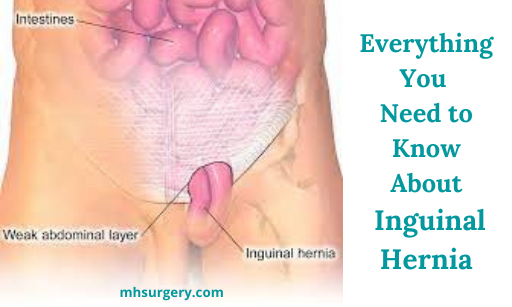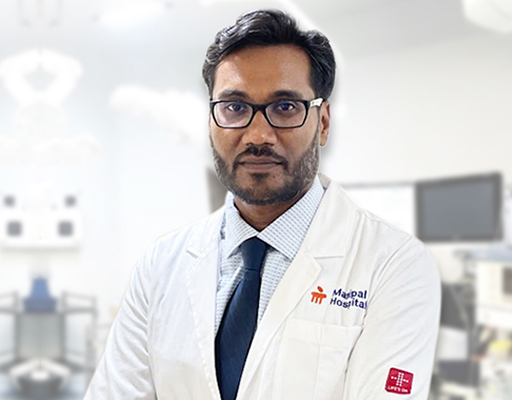-

When the fat from the abdomen bulges out through the lower abdominal wall then an inguinal hernia occurs. Some intestinal part of the bladder also protrudes out through the lower abdominal wall into the growing or inguinal canal. In men, this area has some natural weakness so about 96% of men suffer from this.
Symptoms of Inguinal Hernia
.jpg )
If a hernia cannot be pushed in, its contents can be trapped in the abdominal wall which is said to be strangulated and cuts off the blood supply. It can be dangerous if it is not treated well.
Symptoms if you have triangulated hernia:
- Vomiting and nausea
- A sudden increasing pain
- Difficulty during bowel movements or passing gas
- Fever
- A Red, Purple bulged herniaCauses of Inguinal Hernia
The hernia occurs due to pressure that forces a tissue or an organ through its opening or at a weak spot. It occurs at the later ages of life. Hernia can be caused due to pressure increase in the abdomen; other symptoms of hernia include:
- Constipation or
- A prolonged sneezing or coughing
- Lifting of heavy objects without resting the muscles
- Poor nutrition, obesity or smoking can also cause hernia as a result of weekend muscles.If a person has got through some abdominal surgery he can suffer from an incisional hernia where the intestine pushes through the abdominal wall. Mostly overweight people suffer from such hernias due to their inactive nature.
Pregnant or obese ladies can suffer from Femoral hernia due to the entry of the intestine into the canal that carries the femoral artery into the upper thigh.We have seen in newly born children their navel swells, this is due to the passing of the small intestine through the abdominal wall and is called an Umbilical hernia.
Inguinal Hernia Types
There is a rare occurrence of incarcerated or strangulated hernia but is dangerous if not treated well.
- Incarcerated hernia: It occurs when some fatty tissue or intestine gets in the scrotum and cannot take its place back in the abdomen.
- Strangulated hernia: This is the next stage of incarcerated hernia if it is not treated well. It's a serious condition when blood supply is cut off to the intestine which is the reason for its strangulation. Immediately consult with the best doctor for hernia surgery in Bangalore.Inguinal Hernia Repair/ Treatment
Inguinal hernia is a common surgery also called hernioplasty or herniorrhaphy. There are three type of treatment of Inguinal hernia:
- Open hernia repair: Under general or local anesthesia one is put to sleep. During surgery, a cut is made in the groin and a hernia is pushed back into the abdomen being a primary action to be done. Also, the abdominal wall is strengthened by mesh and stitches so that in the future no such node can occur at the same place.
- Minimally invasive or laparoscopic hernia repair: The surgeon makes a half-inch cut in the lower abdomen to insert a laparoscope which has a mini camera as a tool to click the internal images. Images are further sent to the video monitor so as to get an actual position of the influenced organ. A laparoscopic inguinal hernia repair by making small incisions by the surgeon..jpg )
- Robotic hernia repair: It is done in a similar way as laparoscopic surgery is done. In contrast to laparoscopic surgery, the hernia specialist in Bangalore in robotic surgery sits at a console in the operating room and controls the surgical instruments from there. Robotic surgery can now be utilized to repair the abdominal wall, in addition to treating minor hernias or weak sections.
Also Read: 5 Signs You Need To See A Hernia Repair Specialist
Foods to avoid with inguinal hernia
Foods that cause constipation should not be taken as pizza, pastries, cakes, caffeine drinks, processed dinner, frozen food, etc.
What should not do with an Inguinal Hernia?
- Take a healthy diet to avoid getting overweight.
- Take fibrous fruits and veggies to avoid constipation.
- Heavy lifting can be avoided as it creates pressure on the waist.
- Smoking is dangerous as it creates a cough that aggregates an inguinal hernia.Inguinal Hernia Recovery after Surgery.
After your Surgery for Hernia Repair is done the effect of anesthesia will get stopped and you will get up after some time. It depends on your situation whether you have to be in the recovery room for how long then you will be transferred to the ward.
Also Read: Inguinal Hernia Repair Without Surgery
It depends on the situation that you need to go home or for a few days more you will have to stay in the best hernia hospital in bangalore. Few side effects can affect your body which gets reduced soon after the operation. The effects can be like:
- You may get to know the risk factors and the complications which came during or after the surgery.
- One can have an allergy to particular anesthesia.
- Anesthesia is given according to the body’s requirements. But it may be possible that a patient can get up during the surgery however this may happen very rarely as the patient is monitored continuously.
- In very rare cases death may happen.Complications can occur during an emergency or major surgery if you are having some illness, you are overweight or you smoke. So before a few weeks of the operation, one should stop drinking alcohol or smoking so as to reduce the risk factors and complications which can generate during surgery.
The patients of surgery are suggested to be more active, lose weight and be mentally prepared before surgery so as to reduce the complications and risk during surgery. At times, the risks of surgery are balanced by the benefits of having a pain-less surgery.
Also Read: Why Choose Robotic Hernia Surgery?

Author: DR. MANJUNATH HARIDAS (MD FACS FICS)
Dr. Manjunath Haridas is one of the leading surgeons for Gastrointestinal Sciences in Whitefield, Bangalore. His area of expertise includes Gastrointestinal Surgery - Colon Rectum, Foregut Advanced Laparoscopic Surgery, and Minimally invasive surgery. He is Honored by the American Board of Certification, fellow Of the American College of Surgeons, SAGES membership and more.

